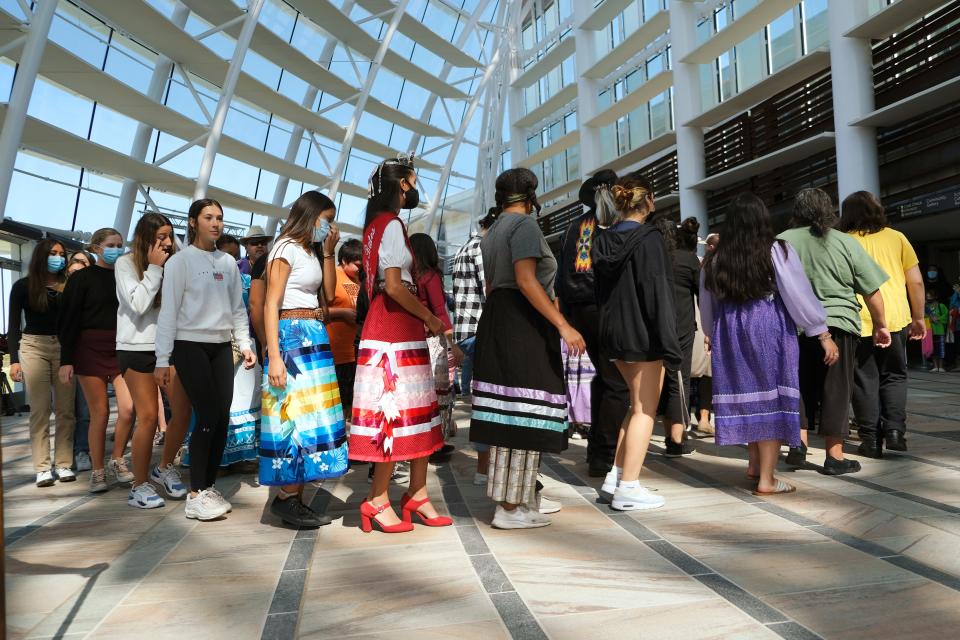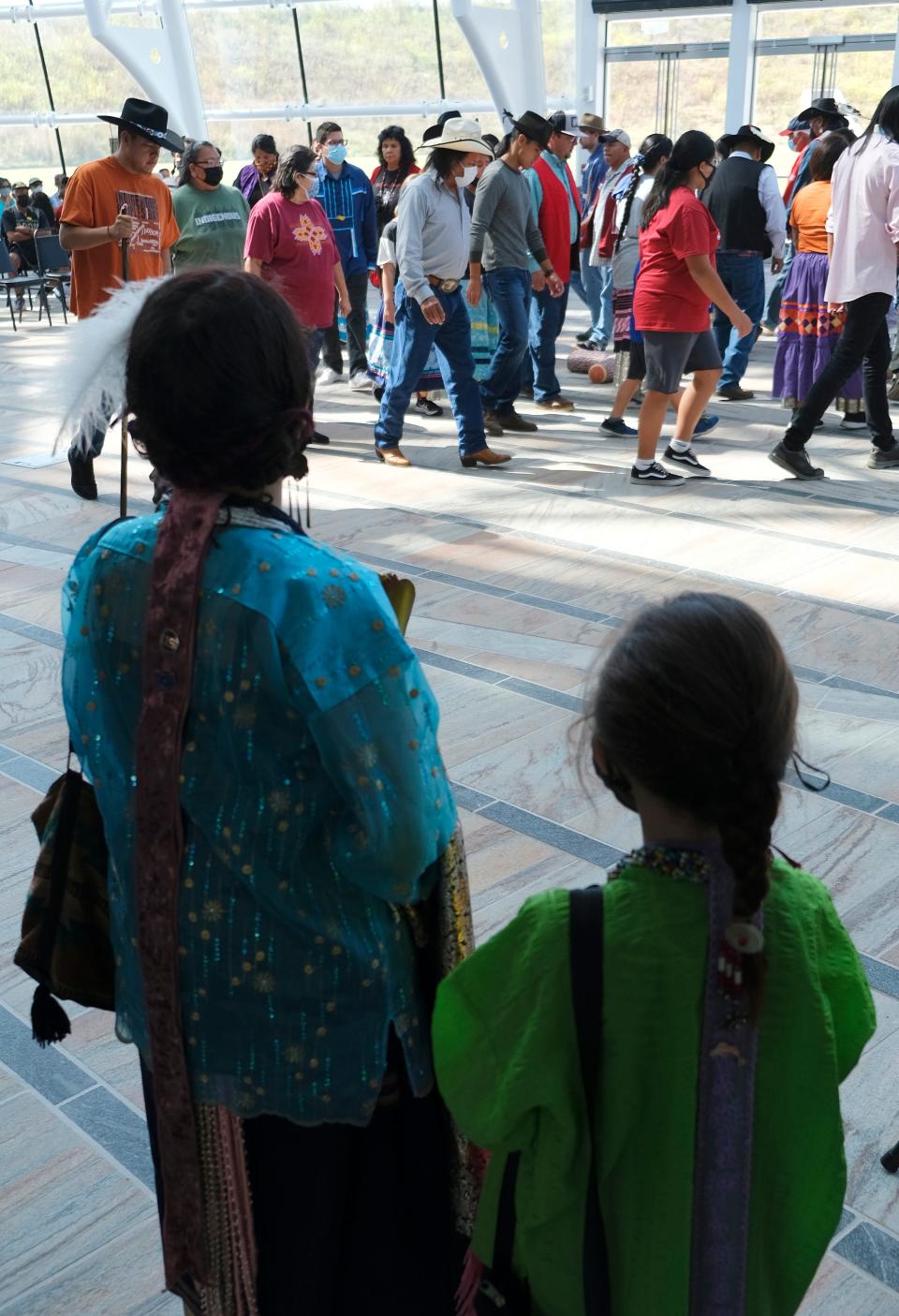5 things to know about Indigenous Peoples Day in the US
- Oops!Something went wrong.Please try again later.
For many Native Americans, the second Monday of October has never been about the man credited with discovering their homelands. But in recent years, more states, cities, counties and schools have signed on to celebrate and honor Indigenous cultures instead of Christopher Columbus.
Indigenous Peoples Day got its biggest boost two years ago, when President Biden became the first U.S. president to formally recognize the day. “We must never forget the centuries-long campaign of violence, displacement, assimilation and terror wrought upon Native communities and tribal nations throughout our country,” Biden said in his proclamation.
The president also echoed a sentiment that Indigenous leaders have voiced for decades: The day should honor the sacrifices and contributions of people who lived on the land first.
Tribal courts now have more power over non-Native defendants. Here's what to know
More than two dozen states have recognized Indigenous Peoples Day
South Dakota became the first state to celebrate Native cultures in place of Columbus Day in 1989. It took more than two decades for a patchwork of other states to join in, most since 2015.
States that have their own versions of the day include Alabama, Alaska, Arizona, California, Hawaii, Idaho, Illinois, Iowa, Kentucky, Louisiana, Maine, Michigan, Minnesota, Nebraska, Nevada, New Mexico, New York, North Carolina, North Dakota, Oklahoma, Oregon, South Dakota, Texas, Vermont, Virginia and Wisconsin.
More than half of those states have proclamations or resolutions that recognize the day, while the others have laws that grant formal recognition. The exact details vary from state to state. For example, Oklahoma and many other states still observe Columbus Day at the same time. A few, including California, recognize the day in September instead.
Dozens of cities also recognize Indigenous Peoples Day, regardless of where their state stands.
Mark your calendars: 20+ ways you can celebrate Native American Heritage Month, Indigenous Peoples Day in Oklahoma
Indigenous Peoples Day is not new in Oklahoma, but the date is
Oklahoma used to celebrate Native American Day in November as part of national Native American Heritage Month. But in 2019, lawmakers voted to move the date to coincide with Columbus Day, after hearing from many tribal leaders whose nations already recognized Indigenous Peoples Day.
Lawmakers tried to combine the dates in 2018. But then-Gov. Mary Fallin vetoed the bill, saying she felt it would take away from the standalone significance of Native American Day in November. Current Gov. Kevin Stitt signed the change into law the following year.
Calls for Indigenous Peoples Day started in the 1970s

Federal policy focused on breaking up tribal nations and assimilating Native people into white society for the first half of the 20th century. The termination era left a legacy of poor health, education and economic outcomes that Indigenous activists brought to mainstream awareness throughout the 1970s. The first calls to drop Columbus Day trace back to this time and received international attention at a United Nations conference in 1977.
In 2011, the National Congress of American Indians — the largest group of tribal nations — formally called on the U.S. to change Columbus Day to Indigenous Peoples Day. The organization said the switch was important to set the historical record straight.
“Having the citizens of the United States of America recognize and celebrate the heritage of Indigenous peoples is necessary to respect their history and unite all peoples together,” said a resolution passed by the group.
Poll: Oklahoma voters want state and tribes to work together amid political tensions
Indigenous Peoples Day is still not a paid U.S. holiday
The U.S. government still observes the second Monday in October as Columbus Day, not Indigenous Peoples Day.
A significant step forward occurred in 2021 when Biden issued his presidential proclamation. He described the day as an opportunity to reaffirm tribal sovereignty and to celebrate the “invaluable contributions and resilience of Indigenous peoples.” He issued a similar proclamation this year.
But proposals to make Indigenous Peoples Day an official federal holiday have not advanced in Congress. For now, federal calendars recognize the month of November as Native American Heritage Month.
Employers can still choose to recognize the day as a paid holiday.

Several free events are planned in Oklahoma to mark Indigenous Peoples Day
Native people observe Indigenous Peoples Day in a variety of ways. In Oklahoma, many tribal nations plan to close their offices Monday so their employees can celebrate the day.
Oklahoma City: Indigenous Peoples Day at First Americans Museum
The event will include cultural performances, games and art.
More information: famok.org
Tulsa: Native American Day at Dreamkeepers Park
The city’s seventh annual celebration includes a parade featuring "Reservation Dogs" co-creator Sterlin Harjo.
More information: facebook.com/TulsaNativeAmericanDay
Tahlequah: Indigenous Peoples Day at Northeastern State University
Community members are invited to join students and faculty for games and more.
More information: https://www.facebook.com/NSUtribalstudies/events.
Editor's note: This story has been updated to reflect the most current information about Indigenous Peoples Day. Email the reporter to add your events to this list.
This article originally appeared on Oklahoman: Here's what to know about Indigenous Peoples Day 2023

